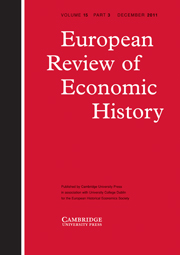Crossref Citations
This article has been cited by the following publications. This list is generated based on data provided by
Crossref.
Easterlin, Richard A.
2000.
The Globalization of Human Development.
The ANNALS of the American Academy of Political and Social Science,
Vol. 570,
Issue. 1,
p.
32.
Easterlin, Richard A
2000.
The Worldwide Standard of Living Since 1800.
Journal of Economic Perspectives,
Vol. 14,
Issue. 1,
p.
7.
Bengtsson, T.
2001.
International Encyclopedia of the Social & Behavioral Sciences.
p.
10079.
Bloom, David
and
Canning, David
2003.
The Health and Poverty of Nations: From theory to practice.
Journal of Human Development,
Vol. 4,
Issue. 1,
p.
47.
Szreter, Simon
2003.
The Population Health Approach in Historical Perspective.
American Journal of Public Health,
Vol. 93,
Issue. 3,
p.
421.
Bengtsson, Tommy
and
Lindström, Martin
2003.
Airborne infectious diseases during infancy and mortality in later life in southern Sweden, 1766–1894.
International Journal of Epidemiology,
Vol. 32,
Issue. 2,
p.
286.
Easterlin, Richard A.
2004.
The Reluctant Economist.
Deaton, Angus S.
2004.
Health in an Age of Globalization.
SSRN Electronic Journal,
LYNCH, JOHN
SMITH, GEORGE DAVEY
HARPER, SAM
HILLEMEIER, MARIANNE
ROSS, NANCY
KAPLAN, GEORGE A.
and
WOLFSON, MICHAEL
2004.
Is Income Inequality a Determinant of Population Health? Part 1. A Systematic Review.
The Milbank Quarterly,
Vol. 82,
Issue. 1,
p.
5.
Nicolini, Esteban A
2004.
Mortality, interest rates, investment, and agricultural production in 18th century England.
Explorations in Economic History,
Vol. 41,
Issue. 2,
p.
130.
Granados, José A Tapia
2005.
Response: On economic growth, business fluctuations, and health progress.
International Journal of Epidemiology,
Vol. 34,
Issue. 6,
p.
1226.
Cervellati, Matteo
and
Sunde, Uwe
2005.
Human Capital Formation, Life Expectancy, and the Process of Development.
American Economic Review,
Vol. 95,
Issue. 5,
p.
1653.
Granados, José A Tapia
2005.
Increasing mortality during the expansions of the US economy, 1900–1996.
International Journal of Epidemiology,
Vol. 34,
Issue. 6,
p.
1194.
Torras, Mariano
2005.
Income and Power Inequality as Determinants of Environmental and Health Outcomes: Some Findings*.
Social Science Quarterly,
Vol. 86,
Issue. s1,
p.
1354.
Torras, Mariano
2006.
The Impact of Power Equality, Income, and the Environment on Human Health: Some Inter‐Country Comparisons.
International Review of Applied Economics,
Vol. 20,
Issue. 1,
p.
1.
Olaogun, Adenike AE
Adebayo, Abayomi A
Ayandiran, Olufemi E
and
Olasode, Olayinka A
2006.
Effects of mothers' socio-economic status on the management of febrile conditions in their under five children in a resource limited setting.
BMC International Health and Human Rights,
Vol. 6,
Issue. 1,
Soares, Rodrigo R.
2007.
On the Determinants of Mortality Reductions in the Developing World.
Population and Development Review,
Vol. 33,
Issue. 2,
p.
247.
Cutler, David M.
Miller, Grant
and
Norton, Douglas M.
2007.
Evidence on early-life income and late-life health from America's Dust Bowl era.
Proceedings of the National Academy of Sciences,
Vol. 104,
Issue. 33,
p.
13244.
Acemoglu, Daron
and
Johnson, Simon
2007.
Disease and Development: The Effect of Life Expectancy on Economic Growth.
Journal of Political Economy,
Vol. 115,
Issue. 6,
p.
925.
Malkin, Robert A.
2007.
Design of Health Care Technologies for the Developing World.
Annual Review of Biomedical Engineering,
Vol. 9,
Issue. 1,
p.
567.


